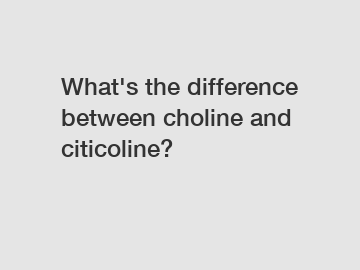What's the difference between choline and citicoline?
What's the difference between choline and citicoline?
Choline and citicoline are two compounds that play important roles in brain function and overall health. While they have similar effects, there are some key differences between the two.
Choline is an essential nutrient that is crucial for various bodily functions. It is a precursor to acetylcholine, a neurotransmitter that is involved in cognitive function, learning, and memory. Choline is naturally present in many foods, such as eggs, liver, and soybeans, but it can also be obtained through dietary supplements. When consumed, choline is converted into acetylcholine, which helps with communication between neurons and supports brain health.

On the other hand, citicoline is a more complex molecule that includes choline as one of its components. It is also known as cytidine diphosphate-choline or CDP-choline. Citicoline is naturally found in the body and can also be synthesized from choline. Due to the presence of cytidine, citicoline has additional functions beyond choline alone. Cytidine is converted into uridine, which is a precursor to the production of phosphatidylcholine, a key component of cell membranes. This process helps with cell repair and regeneration.
The main difference between choline and citicoline lies in their bioavailability and functionality. Choline supplementation typically results in an increase of choline in the blood, but it is not efficiently transported into the brain. In contrast, citicoline is more readily absorbed by the body and readily crosses the blood-brain barrier. Once in the brain, citicoline is utilized more effectively compared to choline alone. Citicoline has been shown to enhance brain energy metabolism, improve blood flow in the brain, and support the synthesis of phospholipids, which are essential for the structure and function of brain cells.
The benefits of choline and citicoline supplementation extend beyond brain health. Both compounds are involved in lipid metabolism and play a role in the synthesis of phosphatidylcholine, which is important for liver function. Choline is also necessary for the proper metabolism of homocysteine, which, when elevated, can increase the risk of cardiovascular diseases. Citicoline has been studied for its potential neuroprotective effects and has shown promising results in improving cognitive function and reducing the risk of age-related cognitive decline.
In conclusion, while choline and citicoline share similarities in their ability to support brain health, there are notable differences between the two. Citicoline, due to its unique composition, is more efficiently absorbed and utilized by the body compared to choline alone. Both compounds have crucial roles in brain function, lipid metabolism, and overall health. Incorporating choline-rich foods and considering citicoline supplementation may provide a comprehensive approach to ensure optimal cognitive function and overall well-being.
Contact us to discuss your requirements of Citicoline Sodium for traumatic brain injury recovery , cdp choline vs citicoline sodium, citicoline sodium benefits. Our experienced sales team can help you identify the options that best suit your needs.
110
0
0


Comments
All Comments (0)